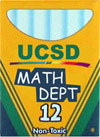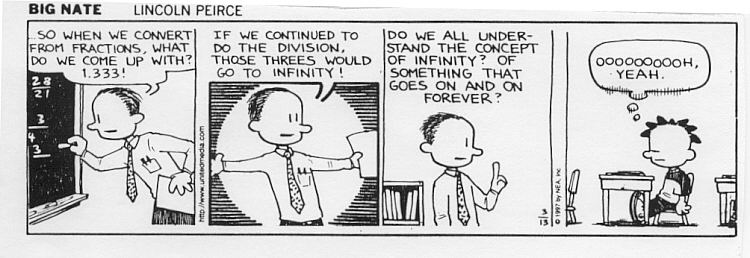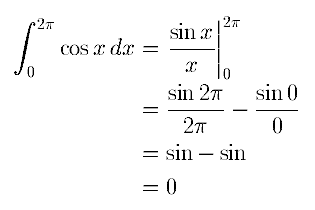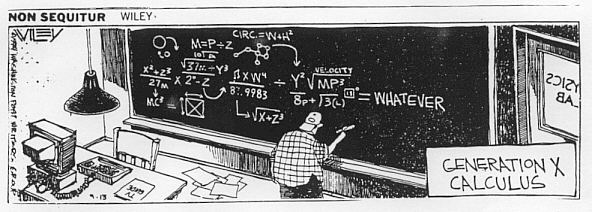 Teaching Tips > Kowalski's Tips
Teaching Tips > Kowalski's Tips
|
Good teaching is like good theater -- it's all in the presentation. How you run your sections -- how you convey yourself, how you talk with your students, how enthusiastic you are when talking about problems -- will determine just how rewarding the experience will be for you. There are volumes and volumes to be said for good teaching, and I will not try to list everything here, since a lot of it comes from experience and practice, practice, practice. But there are a few things to keep in mind. Here are some guidelines to being a good teacher -- and to enjoy TAing while you're doing it. Not the sage on the stage, but the guide on the side. The purpose of the discussion section is not to replace the lecture, but to supplement it. Your job isn't to take the place of the lecturer, but instead to help the students understand the materials presented in those lectures. Avoid simply lecturing about the topics covered on the homework -- they get that in lecture. Instead, you want to help them grasp these topics -- glimmers of insight and intuition to help make the abstract more concrete, shifts in perspective to view a problem in a new light, practice with the language to formulate a problem correctly. There are worse things than being wrong... In a similar light, you don't just want to go into a problem set by solving it for them quickly, cleanly, and without input. Not only are you doing their homework for them, but such omniscient presentation serves to make the material even more befuddling. Don't be afraid to get in there and get dirty by fielding suggestions for an approach, or brainstorming ideas, or doing the problem again by another approach. Don't be afraid to screw up a problem -- be it deliberate or not -- if it serves to illustrate the mechanics. TAs nudge and suggest and prompt and push. Get the students involved in thinking about the problem constantly. Henri Lebesgue once said "The only instruction which a professor can give ... is to think in front of his students." ...And being boring and pedantic are among them. Here are some helpful tips for speaking to your class and keeping them interested.
Be friendly. Don't be their friend. You certainly want to build a good rapport with your students. If they feel comfortable talking to you, then you'll find that your discussion sections are much more vocal and dynamic, and your office hours will be productive. On the other hand, however, you need to maintain authority over your students. When you make policies about noise or late homework, stick to them. When you grade homework, be strict with your regrade policy. Remember, you're there to help them understand the material, but they need to put the effort there in the first place. Otherwise, you will get walked over. You will have hurt feelings and piss off students occasionally... it's part of the job. Sometimes, they're just not gonna get it. You will have to learn to be wary of your students' understanding. You will go over a problem with a student, and he will nod his head and agree with you, suggest the correct sequence of steps to solve it, and come out of discussion thinking he's got it... only to bomb the very next problem completely like it. After a quarter -- a quarter -- of Math 20B, this was an actual student's response to a question on the Final:
Witness the spectacular failure to grasp some very fundamental -- but at the same time, very subtle -- concepts, especially the concept of being the argument of a function. Usually it's not the mechanics that bog the students, it's the more basic skills they have trouble with, such as understanding the nature of the mathematical language or how to use all the millions of rules they've learned since high school. Most of your students look at there homework as nothing but exercises -- mindless manipulations and thoughtless calculations that you should be able to whip out in 5 minutes. One of your most important tasks is to teach students to view their homework as problems -- tasks which require creativity to abstract, care to calculate, and analysis to interpret. Other times, they're just not gonna wanna get it. When I was an undergrad, the idea of taking a class with any other intention than getting the best grade I possibly could in it was entirely alien to me. However, it is certainly not alien to many undergrads, so much so that this other mindset goes by a common title: C = Degree. No matter what, you will not get these kids enthused about their math class. They may only need a certain grade in order to complete the requirements of their major, and it really isn't the place of the TA to tell them that that's a particularly poor worldview. Instead, try to help them grasp as much of the mechanics of the subject as they need -- with as much of a top-down perspective as you can.
Enjoy your job! Be enthusiastic! Show your students unbridled excitement at what you're doing. You're certainly not going to convert all (or maybe even any) of your students to becoming mathematicians themselves, but they might learn to enjoy coming to your sections and office hours and leave the course liking mathematics just a wee bit more than when they enrolled (or at least, they'll hate it less). By being enthusiastic and excited about the material, you create an atmosphere where students feel more free to ask questions and suggest comments. I have never, ever TA'd for a course in which I didn't learn something new, or discover yet a new way to look at something I thought I'd seen from all angles, simply because students figured that I'd enjoy it when they talked to me about their questions or experiences with mathematics. And they were right.
|



